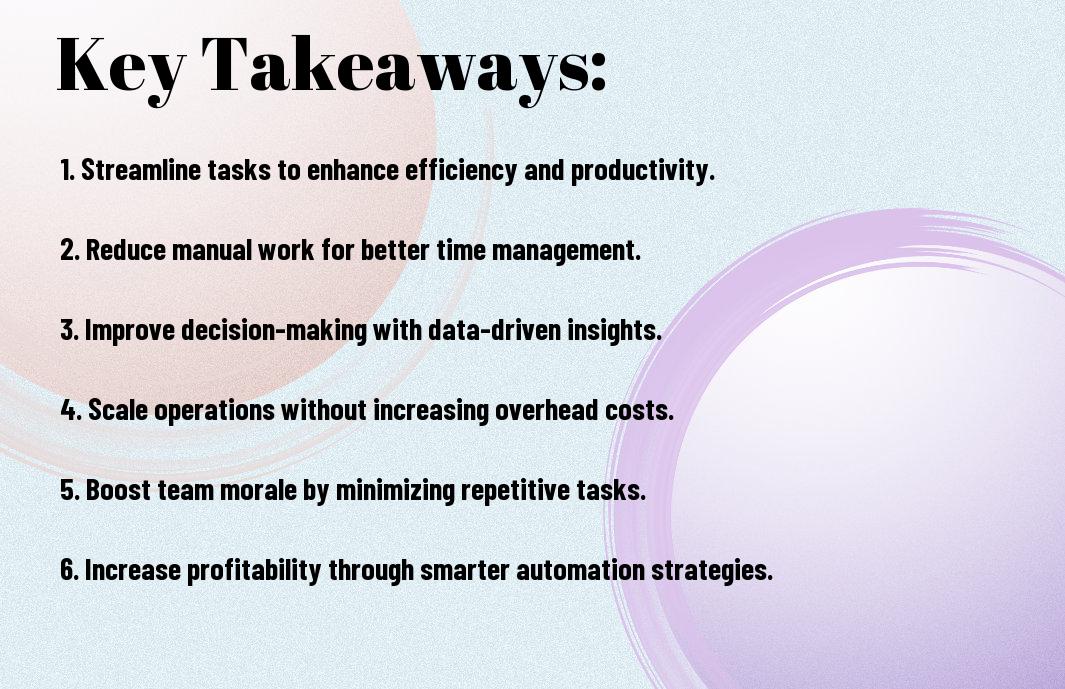Understanding AI Agent Automation
For modern businesses, AI agent automation stands as a transformative solution, enhancing efficiency and productivity. By integrating intelligent agents into your daily operations, you can streamline tasks, minimize errors, and focus on what truly matters – your core business objectives. Embracing this technology can lead to significant operational improvements, ultimately driving your profitability upwards.
What is AI Agent Automation?
An AI agent automation system refers to computer programs designed to autonomously execute repetitive tasks and streamline workflows. These intelligent agents utilize advanced algorithms and machine learning techniques to deliver insights, enhance decision-making, and optimize processes. By employing this technology in your operations, you position your business to harness unparalleled efficiencies while reducing the burden of mundane tasks.
Key Technologies Behind AI Automation
Against the backdrop of AI agent automation are several key technologies, including machine learning, natural language processing (NLP), and robotic process automation (RPA). These tools work in tandem to enable intelligent agents to learn from data, understand human language, and execute tasks across various applications seamlessly.
Plus, machine learning allows algorithms to adapt and improve over time, enhancing their effectiveness. Natural Language Processing enables these agents to communicate and understand text or speech, making interactions more intuitive for users. Meanwhile, Robotic Process Automation automates repetitive tasks by mimicking human actions within software applications, streamlining numerous business processes without direct human oversight. Together, these technologies lay the foundation for successful AI agent automation, offering transformative potential for your organization’s productivity and innovation.
Benefits of AI Agent Automation
Assuming you embrace AI agent automation in your workflow, you can experience a remarkable transformation in your daily operations. This technology not only simplifies complex tasks but also optimizes your work processes, leading to higher profitability. By integrating AI, you can access real-time insights that empower you to make informed decisions, ultimately enhancing your overall business performance.
Streamlining Daily Tasks
Above all, AI agent automation allows you to streamline daily tasks, reducing the time spent on repetitive activities. With its ability to handle scheduling, data entry, and communication, you’ll find that you can focus on more strategic aspects of your work. This seamless integration enables you to navigate your responsibilities more effectively, providing clarity and structure to your workday.
Enhancing Productivity and Efficiency
Above all, AI agent automation significantly enhances your productivity and efficiency. By automating routine tasks, you can devote more time to high-impact projects that drive growth. This not only frees up your schedule but also allows you to allocate resources effectively, ensuring that priorities are met swiftly and accurately.
Another key advantage of AI agent automation lies in its ability to analyze patterns and predict outcomes. This insight empowers you to identify inefficiencies in your workflow and streamline processes accordingly. By using AI to optimize your resource allocation and prioritize tasks, you can achieve substantial gains in productivity. The result is a more organized, efficient work environment that enables you to amplify your profits seamlessly. With AI agents handling the mundane, you can focus on innovation and strategic decision-making.
Implementing AI Agent Automation in Your Business
Despite the initial challenges that may arise during the transition to AI agent automation, the long-term benefits can significantly enhance your operational efficiency and profitability. By strategically implementing these technologies, you can streamline processes, reduce manual workload, and ultimately create a more productive work environment. Embracing AI can transform how you conduct business, allowing you to focus on growth and innovation.
Identifying Automation Opportunities
On your journey toward automation, it’s imperative to identify which tasks and processes within your organization can benefit from AI. Start by analyzing repetitive activities, frequently used workflows, and areas where time is often wasted. Targeting these inefficiencies can empower you to leverage AI effectively, enhancing performance and freeing up resources for higher-level tasks.
Choosing the Right AI Tools
Your selection of AI tools can significantly impact the success of your automation efforts. To create a seamless integration into your current systems, you need to evaluate options that align with your specific business needs and objectives. Look for tools that offer scalability, user-friendly interfaces, and the capability to integrate with existing software.
Hence, choosing the right AI tools involves comprehensive research and understanding of your organization’s unique requirements. Assess features, pricing structures, and customer support options to ensure the chosen tools align with your strategic goals. Additionally, consider vendor reliability and the potential for future upgrades. With well-chosen AI solutions, you can maximize efficiency and drive meaningful results in your business operations.
Overcoming Challenges in AI Automation
Not all businesses are equipped to embrace AI automation effortlessly, and challenges such as resistance to change and concerns about data security can arise. You may face skepticism from employees or difficulties in integrating AI systems with existing workflows. However, tackling these obstacles head-on will enable you to realize the full potential of AI, improving efficiency and boosting your bottom line.
Addressing Resistance to Change
After introducing AI automation to your organization, you might encounter pushback from team members who fear job displacement or are hesitant to adopt new technologies. To address this, it’s vital to communicate the benefits of AI, emphasizing how it can augment their roles rather than replace them. Providing training and support will help ease tensions and foster a culture of innovation.
Ensuring Data Security and Privacy
Addressing data security and privacy concerns is paramount when implementing AI automation. You must ensure that your AI systems comply with relevant regulations and standards to mitigate risks and protect sensitive information.
In fact, safeguarding customer and employee data not only builds trust but also ensures compliance with legal requirements. You should invest in robust encryption, conduct regular audits, and establish clear data governance policies. By doing so, you can confidently leverage AI’s advantages while maintaining a solid reputation and protecting your business from potential legal repercussions.
Measuring the Impact of AI Automation
All businesses must assess the impact of AI automation to unlock its full potential. This process allows you to evaluate the efficiencies gained, understand operational changes, and align automation strategies with your organizational goals. By measuring various factors, you can better harness AI technologies and ensure they contribute positively to your workday and profits.
Key Performance Indicators to Consider
Measuring the right performance indicators is vital to gauge the effectiveness of your AI automation efforts. Focus on metrics such as time savings, error reduction, customer satisfaction, and cost efficiency. By analyzing these KPIs, you can gain insights into how automation transforms your workflow and supports your business objectives.
Analyzing ROI from Automation Efforts
Analyzing the return on investment (ROI) from your automation initiatives helps you understand their financial impact. Consider not only the initial costs of implementing AI technologies but also the long-term savings and revenue enhancements generated. By evaluating both direct and indirect benefits, you can make informed decisions about future investments in automation.
Efforts to calculate ROI should include a comprehensive assessment of labor costs, productivity gains, and customer feedback. You may also consider aspects such as employee satisfaction and retention, which can indirectly contribute to your bottom line. By taking a holistic view of automation’s impact, you can demonstrate its value to stakeholders and refine your approach for optimal results.
Future Trends in AI Agent Automation
Keep your eyes on the horizon as AI agent automation continues to evolve, reshaping the way we work. The future promises to bring even more sophisticated tools that not only enhance efficiency but also drive profitability for your business. By embracing these advancements, you will streamline tasks, empower decision-making, and ultimately reshape your workday.
Emerging Technologies to Watch
Behind the scenes, several emerging technologies are set to revolutionize AI agent automation. Innovations such as quantum computing, advanced neural networks, and 5G connectivity will dramatically improve processing power and speed, enhancing the capabilities of AI agents. These technologies will open up new possibilities for automation, enabling you to stay ahead of the curve.
Predictions for Business Automation Strategies
Automation strategies will increasingly focus on integrating AI agents seamlessly into everyday operations. Data-driven decision-making will become standard practice, allowing you to allocate resources with precision while optimizing performance across your organization.
Even as automated systems advance, you must focus on training and adapting your workforce to collaborate effectively with these technologies. Expect businesses to adopt multi-layered automation strategies that leverage AI agents for routine tasks while allowing human expertise to tackle more complex challenges. The forward-thinking approach will be to create symbiotic relationships between AI agents and your team, maximizing productivity and profitability in the long run.
To wrap up
Summing up, adopting AI agent automation can significantly simplify your workday while amplifying your profits. By integrating these advanced technologies, you streamline various processes, allowing you to focus on core business activities. With enhanced efficiency, you can reduce operational costs and increase productivity, ultimately leading to improved profitability. Embracing AI not only transforms your workflow but also positions your business for future growth and success. Leverage this innovative approach to unlock your team’s full potential today.
FAQ
Q: What is AI Agent Automation and how does it work?
A: AI Agent Automation refers to the use of artificial intelligence technologies to streamline and enhance various tasks in the workplace. It works by utilizing algorithms and machine learning models to automate repetitive processes, improve data analysis, and facilitate decision-making. By implementing AI agents, businesses can reduce manual labor, increase efficiency, and provide better customer service through quick and accurate responses.
Q: How can AI Agent Automation benefit my business’s productivity?
A: Implementing AI Agent Automation can significantly boost your business’s productivity by taking over time-consuming tasks that employees might otherwise spend hours completing. For instance, customer inquiries can be handled by AI agents, freeing up staff to focus on more complex issues. Additionally, AI can provide data-driven insights that help in optimizing operations, thus leading to quicker decision-making and improved overall performance.
Q: Is AI Agent Automation suitable for all types of businesses?
A: Yes, AI Agent Automation can be customized to suit a variety of industries and business sizes. Whether you are in retail, finance, healthcare, or any other sector, AI agents can be tailored to address specific challenges and tasks unique to your business. By assessing your operational needs and goals, AI tools can be integrated to facilitate a more efficient workflow, thereby enhancing both employee satisfaction and profitability.



